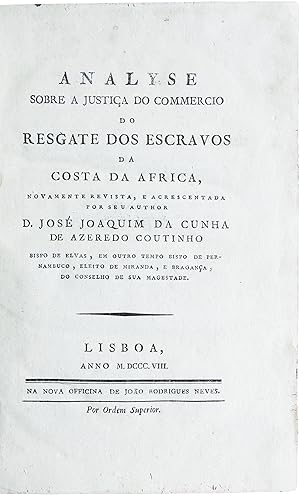About this Item
2 works in 1 volume. 4°, contemporary sheep (rather worn but sound), smooth spine with gilt fillets and crimson leather lettering piece, short title gilt, text block edges sprinkled red and blue. A few very light spots in blank margins of title page. Overall in very good condition. xv, 112 pp., (1 l. errata). *** FIRST EDITION IN PORTUGUESE of the Analyse, in which Azeredo Coutinho argues that both slavery and the slave trade are indispensable for the agricultural development of Brazil, and thus for the prosperity and security of Portugal and her Empire. In the Concordancia, printed here for the first time, he argues that one cannot attack slavery without attacking the concept of private property, and that the laws forbidding the enslavement of Indians do not apply to Africans. The Concordancia complements the Analyse and is often bound with it.Azeredo Coutinho wrote the Analyse in 1796 and submitted it to the Academia das Sciencias, which refused to publish it. He then translated it into French and had it printed in London, 1798, under the title Analyse sur la justice du commerce du rachat des esclaves de la côte d'Afrique. As the debate over the slavery question became more heated, Azeredo Coutinho expanded the work, adding 48 new sections (this Portuguese text has 131, compared to 83 in the French) and new footnotes. In 1808, Azeredo Coutinho was finally granted a license to publish the work in Portuguese. It is surely no coincidence that the British had abolished slavery in the previous year and were pressuring the Portuguese to do the same, while the United States had just passed a law banning the importation of slaves.Azeredo Coutinho (1742-1821), a native of Rio de Janeiro and a leading figure in the Brazilian Enlightenment, was one of the most influential Brazilian writers of the late eighteenth to early nineteenth century, and "the greatest reactionary of his time" (Borba). He served as Archdeacon of Rio de Janeiro, Bishop of Pernambuco and Inquisitor General in Portugal, and he worked with great zeal to develop the commerce and industry of his native Brazil.*** Borba de Moraes (1983) I, 231; Período colonial pp. 106-7. Sacramento Blake IV, 477-8 (also listing, without collation, what is surely a ghost edition of Lisbon, 1796). Innocêncio IV, 385: without collation. Rodrigues 782 and 784. Greenlee Catalogue I, 387: listing only the Analyse. JCB, Portuguese and Brazilian Books 808/20-1. Bethell, Abolition of the Brazilian Slave Trade p. 6. Porbase locates four copies, two in the Biblioteca Nacional de Portugal, one in the Biblioteca João Paulo II-Universidade Católica Portuguesa, and one in the Biblioteca Municipal de Elvas. Copac repeats British Library and also lists the internet resource. NUC: both works at DLC, InU and MH-BA; Concordancia alone at MB; London, 1798 edition at DLC, RPJCB and MB.*** BOUND WITH: COUTINHO, José Joaquim da Cunha de Azeredo. Concordancia das leis de Portugal, e das bullas pontificias, das quaes humas permittem a escravidão dos pretos d'Africa, e outras prohibem a escravidão dos Indios do Brazil. Lisbon: Na Nova Officina de João Rodrigues Neves, 1808. Some minor spotting to the final leaves. In good to very good condition. 21, (1) pp.* Borba de Moraes (1983) I, 342; and Período colonial p. 108. Sacramento Blake IV, 478. Innocêncio IV, 385: had not seen a copy. OCLC: 65237026 (digitized); 81417633 (University of California San Diego, British Library); 251671778 (Universitätsbibliothek zu Berlin-Preussischer Kulturbesitz). Porbase locates four copies, two in the Biblioteca Nacional de Portugal, one in the Biblioteca João Paulo II-Universidade Católica Portuguesa, and one in the Biblioteca Municipal de Elvas. Copac repeats British Library and also lists an Internet resource.
Seller Inventory # 43367
Contact seller
Report this item


